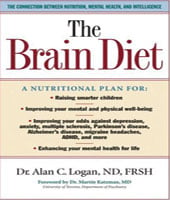Advertisement
The Brain Diet
by Alan C. Logan, ND, RSHCumberland House, 2006260 pages People in the medical and natural health fields, along with the rest of us, are long overdue for a body of work that targets medicine’s final frontier the brain. Alan C. Logan uses recent, relevant research to show the definitive link between our mental state and … Continued

by Alan C. Logan, ND, RSH
Cumberland House, 2006
260 pages
People in the medical and natural health fields, along with the rest of us, are long overdue for a body of work that targets medicine’s final frontier the brain. Alan C. Logan uses recent, relevant research to show the definitive link between our mental state and what we eat.
Logan is qualified on more than one front: he is a member of the Harvard Medical School’s Mind-Body Medical Institute and a graduate of the Canadian College of Naturopathic Medicine. He also studied at Harvard Medical School, is editor of the International Journal of Naturopathic Medicine, and contributes to health magazines such as alive. These accreditations serve to provide a well-rounded, well-grounded perspective on a subject that is soon to explode into the popular media; I predict all those who follow will consult this book.
Logan refers to a wide scope of fascinating scientific research in very reader-friendly terms. Dr. Martin Katzman, professor of psychiatry at the University of Toronto calls Logan “a progressive thinker, well capable of synthesizing complex science into clear, clinically useful ideas.” Indeed, Logan serves up a blend of facts and strategies without overwhelming his audience. Each paragraph offers good food for thought yet leaves us hungry for the next.
To begin, The Brain Diet floats the premise that our genes are responsible for 50 percent or less of most brain conditions. This means environmental factors, including stressors, physical activity, and now nutrition, play an important role that has been ignored far too long.
In helping readers defend themselves and their children against brain disorders such as depression, anxiety, MS, Parkinson’s, Alzheimer’s, and ADHD, Logan leaves nothing to guesswork. He is clear and forthcoming with practical applications to improve mental health and intelligence.
Coffee, he demonstrates, has direct health benefits for the human brain. Healthy fats too, comprise a major discussion in this book; since 60 percent of the human brain is made up of fat, there is a direct effect of dietary fats on brain performance.
Disproportionate to its small size, the brain uses a whopping “20 percent of the entire energy supply of the body.” This alone is something to consider with each mouthful we ingest. When was the last time you consciously fed your brain as you sat down to dinner?




